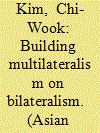| Srl | Item |
| 1 |
ID:
138918


|
|
|
|
|
| Summary/Abstract |
In this article, I develop the multilateralism-through-bilateralism thesis by analyzing Asian bilateral investment treaties (BITs)—the idea that dense networks of bilateral agreements with similar contents provide the architecture for de facto multilateralism in regional economic governance. BIT networks are becoming increasingly dense and converging in content, and hence are analogous to a multilateral architecture for investment governance in the region. Key elements of this process are the degree of density and uniformity of BIT networks. Using the tool of social network analysis, I show that Asian BIT networks have become much denser, and they converge rather than diverge in terms of key provisions such as investment protection and dispute settlement procedures. I suggest that bilateralism is not necessarily a substitute for, or a stumbling block to, multilateralism, but should rather be viewed as another useful path toward multilateral governance.
|
|
|
|
|
|
|
|
|
|
|
|
|
|
|
|
| 2 |
ID:
138913


|
|
|
|
|
| Summary/Abstract |
The Lee Myung-bak government’s response to the sinking of the South Korean warship Cheonan in March 2010 was a hard-line policy that met with widespread public doubt and criticism. His conservative government reacted to critics with suppression of free speech and use of state power to control the media. As a result, international ratings of press freedom and Internet freedom for South Korea were downgraded. The government relied on national security rhetoric; however, its primary legal tools were not the National Security Law but rather criminal defamation and broadcasting and Internet regulations. I discuss some factors that make South Korean democracy vulnerable to erosion of press freedom, including the enduring influence of the Cold War, fragility of liberalism, and the lack of executive constraints.
|
|
|
|
|
|
|
|
|
|
|
|
|
|
|
|
| 3 |
ID:
138912


|
|
|
|
|
| Summary/Abstract |
In this article I assess the limits and potential of South Korea’s democracy as revealed by a review of political developments related to the Cheonan incident. I argue that the incident’s aftermath shows that South Korea’s democratic principles and procedures remain vulnerable to pressures generated by national security concerns, although this vulnerability was covered to a limited degree by an open public sphere and active civil society. Korea’s political functioning in terms of republican principles and procedural democracy was seriously tested as imperatives of national security created the “state of exception.” But civil society appropriated new technologies as well as old tactics to generate “public spheres” of deliberation. I suggest that Korean democracy during the Cheonan crisis reflects the resiliency and vulnerability of the “division system” in which South Korea’s politics is embedded.
|
|
|
|
|
|
|
|
|
|
|
|
|
|
|
|
| 4 |
ID:
138917


|
|
|
|
|
| Summary/Abstract |
In this article, I examine the state-supported “modernization” (xiandaihua) of Confucianism in China and argue that behind this revival is an intention to institutionalize Confucianism in order to consolidate the leadership and ideological control of the Chinese Communist Party (CCP). However, while the CCP-led government has pragmatically adopted Confucianism to maintain the current power structure, there is no evidence that Confucianism will become the theoretical heart of the party. Confucianism has not acquired, nor will it acquire, a political position equal to Marxism. Many Chinese intellectuals have confirmed this tendency.
|
|
|
|
|
|
|
|
|
|
|
|
|
|
|
|
| 5 |
ID:
138916


|
|
|
|
|
| Summary/Abstract |
In this article we examine the debate among legal experts in China over the recent practice of death penalty criminal reconciliation (DPCR), which is a program that seeks to reconcile an offender convicted of a capital offense with the victim by requiring the offender to meet with, apologize, and pay economic compensation to the victim in exchange for a death sentence commuted to life in prison. Proponents of DPCR believe it provides important financial and emotional benefits to victims, helps rehabilitate offenders, and alleviates the wider social tensions generated by the offense committed. Opponents argue that DPCR violates the basic principle of equality before the law because the decisions reached using this process are sometimes influenced by public opinion and often biased toward those who can afford to pay compensation. These critics suggest that DPCR should be replaced with a comprehensive system of state compensation for victims of capital offenses.
|
|
|
|
|
|
|
|
|
|
|
|
|
|
|
|
| 6 |
ID:
138914


|
|
|
|
|
| Summary/Abstract |
In this article, I examine the 2010 sinking of the South Korean naval ship Cheonan to assess the popular theory of “rally-round-theflag,” focusing especially on its domestic mechanisms. What did the South Korean government do to sell its version of the incident to the public? How effective was it? What were its obstacles? In addition, I explore the possibility that the authorities may in fact have limited ability to engage in effective diversionary activity. I conclude that authorities’ efforts were partially successful because of their monopoly of information, control over the press, repression, and institutionalization of memories. Obstacles to their efforts included nongovernmental organizations, independent journalists, and the president’s low popularity.
|
|
|
|
|
|
|
|
|
|
|
|
|
|
|
|
| 7 |
ID:
138915


|
|
|
|
|
| Summary/Abstract |
What changes has the Cheonan incident brought about in the Northeast Asian region? How and to what extent have those changes shifted as time goes by? I find that the Cheonan sinking has played a key role in deepening the ideological chasm in South Korea between conservatives and progressives. It has also become a serious obstacle to the improvement of South Korea–North Korea relations, and has been the catalyst for the emergence of a Cold War–like rivalry between the US–South Korea–Japan and the China–North Korea–Russia blocs. However, relations among neighboring countries in Northeast Asia have shifted over time, including significant improvement in China–Republic of Korea relations and worsening of relations between China and North Korea and South Korea and Japan.
|
|
|
|
|
|
|
|
|
|
|
|
|
|
|
|